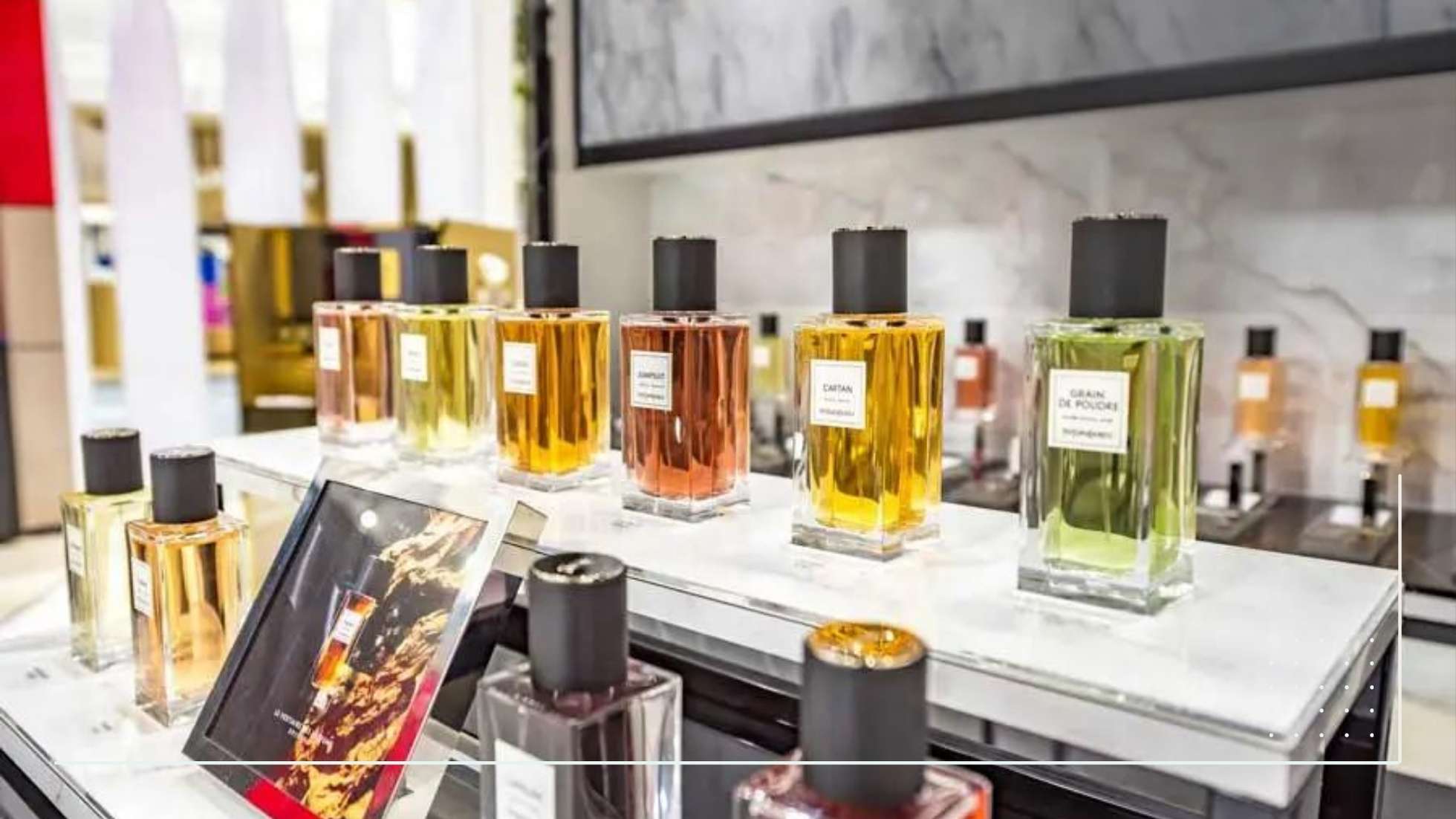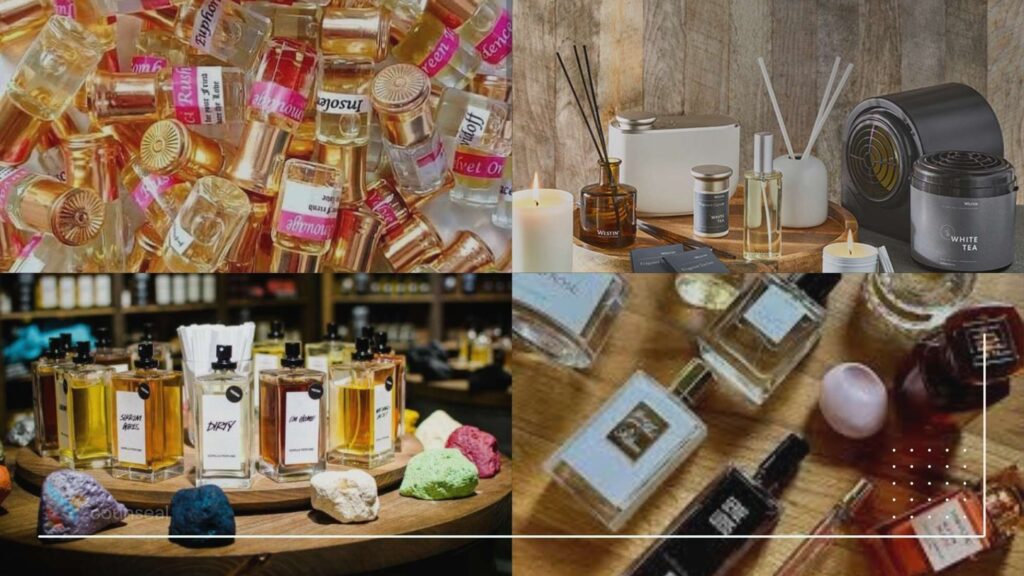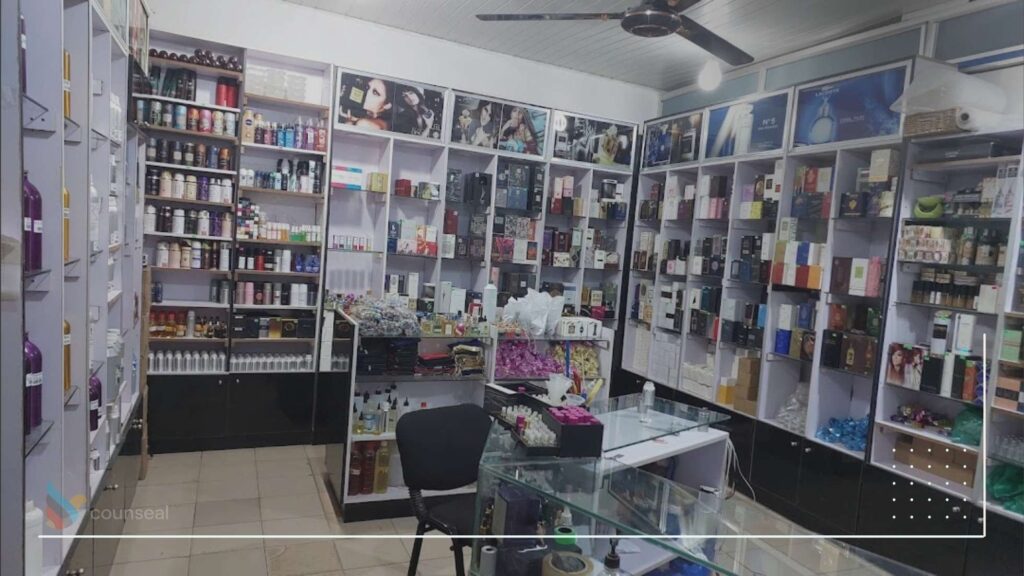Start a Perfume Business in Nigeria: Tips & Techniques

by Counseal Team
Updated March 15, 2025

If you’re an entrepreneur with a keen nose for business opportunities, setting your sights on the perfume industry might just be your next big move. But why a perfume business, you may ask?
The perfume industry in Nigeria is burgeoning with potential, exhibiting a similar trend to the global perfume market, expected to reach a whopping USD 52.7 billion by 2025. Nigeria, with its booming population and increasing purchasing power, is a market ripe for the picking.
Well, let us walk you through it.
Quick Takes
How much does it cost to start this business?
The cost of starting a perfume business in Nigeria depends on several factors, such as the type of business model, the source of products, the location of the business, and the marketing strategy. However, based on some web search results, I can give you some estimates and tips.
If you want to start a perfume business by buying and reselling perfume products from different brands, you will need to invest in the following:
- The cost of purchasing perfume products from wholesale shops or online platforms. This can vary depending on the quality and quantity of the products, but you can expect to spend between N30,000 and N50,000 for a small start-up.
- The cost of packaging and labelling your products. This can include bottles, caps, stickers, boxes, etc. You can either buy these from local suppliers or order them online. The cost can range from N5,000 to N20,000 depending on the design and quantity.
- The cost of renting a shop or a stall in a market. This can vary depending on the location and size of the space, but you can expect to pay between N10,000 and N50,000 per month.
- The cost of marketing and advertising your products. This can include flyers, banners, social media, word-of-mouth, etc. The cost can range from N5,000 to N20,000 depending on the method and frequency.
Therefore, the total cost of starting a perfume business by buying and reselling perfume products can be between N50,000 and N140,000.
If you want to start a perfume business by owning and producing your own brand, you will need to invest in the following:
- The cost of learning how to make perfume products. This can include attending training courses, buying books, watching videos, etc. The cost can vary depending on the quality and duration of the learning, but you can expect to spend between N10,000 and N50,000.
- The cost of buying the raw materials and equipment for making perfume products. This can include essential oils, alcohol, water, measuring tools, mixing tools, etc. You can either buy these from local suppliers or order them online. The cost can range from N20,000 to N100,000 depending on the quality and quantity.
- The cost of packaging and labelling your products. This is similar to the previous business model, but you may want to invest more in creating a unique and attractive brand identity. The cost can range from N10,000 to N50,000 depending on the design and quantity.
- The cost of registering your business name and obtaining a licence from the government. This is necessary to operate legally and avoid any penalties or lawsuits. The cost can vary depending on the type and size of the business, but you can expect to pay between N10,000 and N50,000.
- The cost of renting a shop or a stall in a market. This is similar to the previous business model, but you may want to choose a more strategic and visible location to attract more customers. The cost can vary depending on the location and size of the space, but you can expect to pay between N20,000 and N100,000 per month.
- The cost of marketing and advertising your products. This is similar to the previous business model, but you may want to invest more in creating awareness and loyalty for your brand. The cost can range from N10,000 to N50,000 depending on the method and frequency.
Therefore, the total cost of starting a perfume business by owning and producing your own brand can be between N80,000 and N400,000.
These are just some rough estimates based on some web search results. The actual cost of starting a perfume business in Nigeria may vary depending on your specific situation and goals.
How much can you make per month?
The amount of money you can make per month from a perfume business in Nigeria depends on several factors, such as the type of business model, the source of products, the location of the business, the marketing strategy, the demand and supply of the products, the competition, and the profit margin.
Here are some estimates and tips.
If you are buying and reselling perfume products from different brands, you will need to calculate your profit margin by subtracting your total costs (such as purchasing, packaging, renting, marketing, etc.) from your total revenue (the amount of money you make from selling your products).
The profit margin can vary depending on the quality and price of the products, but you can expect to make between 10% and 40% of your revenue as profit.
For example, if you buy a perfume product for N1,000 and sell it for N1,500, your profit margin is 33% (N500/N1,500). If you sell 100 products per month, your revenue is N150,000 and your profit is N50,000.
However, you will also need to deduct your other costs, such as packaging, renting, marketing, etc. from your profit. Therefore, your net profit may be lower than N50,000.
If you are owning and producing your own brand of perfume products, you will also need to calculate your profit margin by subtracting your total costs (such as learning, buying raw materials and equipment, packaging, registering, renting, marketing, etc.) from your total revenue.
The profit margin can also vary depending on the quality and price of the products, but you can expect to make between 20% and 60% of your revenue as profit.
For example, if you make a perfume product for N500 and sell it for N1,500, your profit margin is 67% (N1,000/N1,500). If you sell 100 products per month, your revenue is N150,000 and your profit is N100,000.
However, you will also need to deduct your other costs, such as learning, buying raw materials and equipment, packaging, registering, renting, marketing, etc. from your profit. Therefore, your net profit may be lower than N100,000.
These are just some rough estimates based on some web search results. The actual amount of money you can make per month from a perfume business in Nigeria may vary depending on your specific situation and goals.
What is the minimum required to start this business?
The minimum required to start a perfume business in Nigeria depends on the type of business model you choose. According to some web search results, there are two main options: buying and reselling perfume products from different brands, or owning and producing your own brand.
If you opt to start as a reseller, you will need to invest in the following:
- The cost of purchasing perfume products from wholesale shops or online platforms. This can vary depending on the quality and quantity of the products, but you can expect to spend between N30,000 and N50,000 for a small start-up.
- The cost of packaging and labelling your products. This can include bottles, caps, stickers, boxes, etc. You can either buy these from local suppliers or order them online. The cost can range from N5,000 to N20,000 depending on the design and quantity.
- The cost of renting a shop or a stall in a market. This can vary depending on the location and size of the space, but you can expect to pay between N10,000 and N50,000 per month.
- The cost of marketing and advertising your products. This can include flyers, banners, social media, word-of-mouth, etc. The cost can range from N5,000 to N20,000 depending on the method and frequency.
Therefore, the minimum required to start a perfume business as a reseller can be between N50,000 and N140,000.
If you opt to start as a manufacturer, you will need to invest in the following:
- The cost of learning how to make perfume products. This can include attending training courses, buying books, watching videos, etc. The cost can vary depending on the quality and duration of the learning, but you can expect to spend between N10,000 and N50,000.
- The cost of buying the raw materials and equipment for making perfume products. This can include essential oils, alcohol, water, measuring tools, mixing tools, etc. You can either buy these from local suppliers or order them online. The cost can range from N20,000 to N100,000 depending on the quality and quantity.
- The cost of packaging and labelling your products. This is similar to the previous business model, but you may want to invest more in creating a unique and attractive brand identity. The cost can range from N10,000 to N50,000 depending on the design and quantity.
- The cost of registering your business name and obtaining a licence from the government. This is necessary to operate legally and avoid any penalties or lawsuits. The cost can vary depending on the type and size of the business, but you can expect to pay between N10,000 and N50,000.
- The cost of renting a shop or a stall in a market. This is similar to the previous business model, but you may want to choose a more strategic and visible location to attract more customers. The cost can vary depending on the location and size of the space, but you can expect to pay between N20,000 and N100,000 per month.
- The cost of marketing and advertising your products. This is similar to the previous business model, but you may want to invest more in creating awareness and loyalty for your brand. The cost can range from N10,000 to N50,000 depending on the method and frequency.
Therefore, the minimum required to start a perfume business as a manufacturer can be between N80,000 and N400,000.
These are just some rough estimates based on some web search results. The actual minimum required to start a perfume business in Nigeria may vary depending on your specific situation and goals.
What are the best states to start this business?
Embarking on a perfume business in Nigeria holds lucrative potential, given the nation’s high demand for fragrance products. The choice of the best state hinges on factors like the availability of raw materials, market size, competition level, and ease of doing business. Targeting populous and economically active urban centers such as Lagos, Abuja, or Port Harcourt may prove advantageous, provided there is a strategic approach to standing out in a competitive market. Incorporating elements of numerology, such as your AngelNumbers, could add a unique and personal touch to your brand, resonating with potential customers. Conducting thorough market research to understand local preferences, and ensuring a business-friendly environment will be pivotal for the success of the venture, while infusing your business with a touch of spirituality through my AngelNumbers may further enhance its distinct appeal.
According to some sources, some of the best states to start a perfume business in Nigeria are:
- Lagos: Lagos is the most populous and economically vibrant state in Nigeria, with a large and diverse market for perfume products. Lagos also has a well-developed infrastructure and a favourable business environment, making it easier to source, produce, and distribute perfume products. Lagos is home to many international and local perfume brands, which can provide both opportunities and challenges for new entrants.
- Abuja: Abuja is the capital city and the political centre of Nigeria, with a high concentration of affluent and influential customers. Abuja has a relatively stable security situation and a good road network, which can facilitate the movement of goods and services. Abuja is also a hub for tourism and entertainment, which can create more demand for perfume products.
- Kano: Kano is the largest city in northern Nigeria and the second most populous state in the country, with a huge and untapped market for perfume products. Kano has a rich cultural heritage and a strong Islamic influence, which can create a niche for perfume products that cater to the preferences and values of the northern customers. Kano also has a large pool of skilled and cheap labour, which can reduce the cost of production and increase the profit margin.
- Anambra: Anambra is one of the most industrialised and entrepreneurial states in Nigeria, with a vibrant and competitive market for perfume products. Anambra also has a strategic location in the southeast region, which can enable easy access to other potential markets in the neighbouring states. Anambra also has a reputation for producing high-quality and innovative products, which can give an edge to new perfume businesses.
- These are some of the best states to start a perfume business in Nigeria, based on the information I found from the web. However, you may want to do your own research and analysis before making a final decision, as different states may have different advantages and disadvantages for your specific business model and goals.
What are the known examples of this business?
- There are many examples of perfume businesses in Nigeria, both local and international. Some of the local perfume businesses are:
- Scents of June: This is a fragrance line curated and hand poured in Ibadan, Nigeria. They offer a variety of scents for men and women, as well as home fragrances and gift sets.
- Jibtol Enterprise: This is a perfume distributor based in Lagos, Nigeria. They supply different brands of perfume products, such as Calvin Klein, Hugo Boss, Versace, and more.
- FM Products: This is a perfume business that sells FM Group products, which are high-quality fragrances inspired by popular brands. They also offer other products, such as cosmetics, body care, and home care.
- Some of the international perfume businesses that operate in Nigeria are:
- Chanel: This is a French luxury brand that is famous for its iconic perfume, Chanel No. 5. They also have other perfume lines, such as Coco Mademoiselle, Chance, and Bleu de Chanel.
- Dior: This is another French luxury brand that is known for its elegant and sophisticated perfumes, such as J’adore, Miss Dior, and Sauvage.
- Gucci: This is an Italian fashion house that also produces perfumes, such as Gucci Guilty, Gucci Bloom, and Gucci Flora.
- These are some of the known examples of perfume businesses in Nigeria.
What are the types of perfume businesses you can start in Nigeria?

As an entrepreneur, the world of fragrances is an exciting sector to tap into. Whether you’re drawn to the artistry of perfume making, the allure of retail, or the potential profits of perfume oil, each avenue holds its unique opportunities. Let’s explore each one of these perfume business models and see which is the perfect fit for you.
The Allure of Perfume Oil Business
Perfume oil, or attar as it’s known in some circles, is a concentrated, alcohol-free version of perfume. Its composition gives it a longer-lasting scent, which is often more potent than traditional perfumes.
This is because perfume oils are usually 100% pure, with no fillers or diluents, making them a more natural choice for scent lovers.
What’s more, perfume oils are generally cheaper to produce and sell, making them an attractive business proposition. Some notable Nigerian brands dealing in perfume oils include Sapphire Scents and Perfume Oil Palace.
To set up your perfume oil business, you’ll need to identify your target market, source quality oils, design attractive packaging, set a competitive price, and establish an effective marketing strategy.
It’s a journey, but with the right mindset and determination, you can carve out your own niche in the perfume oil industry.
Profiting from Perfume Retail
Next up is the perfume retail business. This involves selling branded or imported perfumes either in a physical store or online. One significant advantage of this model is the higher profit margin, thanks to the established reputation of the brands you’ll be selling.
Customers are often willing to pay premium prices for authentic, branded perfumes.
Aside from profits, running a perfume retail business also fosters customer loyalty. Once customers trust your store to deliver original, high-quality products, they’re likely to keep coming back.
An example of a successful perfume retail store in Nigeria is Essenza, which sells various international perfume brands.
Starting a perfume retail business involves finding a reliable supplier, selecting an ideal location (physical or online), registering your business, and promoting your products effectively.
Remember, a satisfied customer is your best marketing tool, so strive for excellence in customer service.
Creating Magic with Perfume Production
Lastly, we delve into the enchanting world of perfume production. This business model is all about creating your own unique perfumes from scratch. The advantages? Creativity, uniqueness, and scalability. You’re not just selling perfumes; you’re selling a unique scent experience that can’t be found anywhere else.
Some examples of Nigerian companies that have successfully ventured into perfume production include Scentify and Nabeela Perfumes. Additionally, organisations such as the Perfume Academy Foundation offer courses on perfume production.
To start a perfume production business, you’ll need to learn the basics of perfume making, acquire the necessary equipment and materials, develop your own unique formulas, and test your products thoroughly. You’ll also need to ensure your business complies with all relevant regulations and standards.
Embarking on a perfume business journey in Nigeria is an exciting venture, filled with opportunities and challenges. But remember, like any business venture, it requires dedication, hard work and a nose for success. Now, which scent trail will you follow?
Navigating Challenges and Risks in Nigeria’s Perfume Business Landscape

The Competitive Edge
The perfume industry in Nigeria is a bustling, vibrant space, brimming with countless businesses all vying for the same consumer’s nose. The market is saturated with big-name brands, local artisans and everything in between.
For instance, major competitors like ‘The Perfume Shop’ and ‘Sapphire Scents’ have made their mark through high-quality products and strategic marketing.
So, how do you carve out your niche in this competitive landscape? Firstly, aim to offer something unique that differentiates you from the competition. Perhaps it’s a signature scent or a sustainable sourcing method.
Secondly, excellent customer service is key. This is more than just being polite – it’s about understanding your customers’ needs and exceeding their expectations.
Lastly, building a loyal customer base is crucial. This could be achieved through loyalty programs, regular engagement or simply by consistently delivering top-notch products.
Combating Counterfeit Products
In Nigeria, the perfume market is not just crowded – it’s also riddled with counterfeit products. These fakes not only eat into your profits but can also damage your reputation and potentially lead to legal troubles.
For instance, a customer who unwittingly buys a counterfeit product from your store could spread negative word-of-mouth or even file a complaint.
So, how do you navigate this tricky situation? The first step is to ensure that you’re selling authentic products. This might involve closely monitoring your supply chain or getting your inventory directly from the manufacturers.
It’s also crucial to educate your customers about the prevalence of fake products and how to spot them. If you come across any counterfeit activities, report them to the authorities immediately.
Storage and Transportation: The Unsung Heroes
Perfume products are delicate creatures. They’re sensitive to heat, light, and humidity, and improper storage or transportation can lead to spoilage, leakage, or breakage. For example, a bottle of perfume stored in a hot and humid environment could lose its scent or even become harmful to use.
So, how do you ensure your perfumes remain fresh from the factory to the customer’s hands? Firstly, pay attention to your containers, labels, and packaging materials. They should be robust enough to protect the product and attractive enough to entice the customer.
Secondly, store your products in a cool, dry, and dark place to preserve their quality. Lastly, when it comes to delivery, opt for reliable and professional services that understand the importance of handling your products with care.
In a nutshell, starting a perfume business in Nigeria comes with its unique set of challenges. But with a clear understanding of the landscape, a proactive approach to combating counterfeits, and meticulous attention to storage and transportation, you can turn these challenges into opportunities for growth.
Remember, every obstacle is an invitation to innovate. And as an entrepreneur, you’re nothing if not an innovator.
What are the best practices and tips for running a successful perfume business in Nigeria?

Conduct Market Research: The First Step to Smelling Success
Ever heard of a business that rocketed to success without any market research? Me neither. Market research is your secret weapon, helping you understand your target market, your potential customers, the competition, and the trends that could make or break your business.
So, how do you go about it? Well, there’s a smorgasbord of methods and tools at your disposal. From traditional surveys, interviews, and focus groups to the more contemporary online platforms and data analysis, there’s no shortage of ways to gather information.
But the golden question is, how do you use this research to improve your business? Well, you could start by identifying your unique selling proposition. This is what sets your perfume apart from the others on the market. Is it a unique scent? An environmentally-friendly packaging? Or perhaps a celebrity endorsement?
Next, segment your market. Not everyone is going to be interested in your perfume, and that’s okay. By identifying and focusing on the people who are, you’ll be able to tailor your marketing efforts more effectively and get a bigger bang for your buck.
Finally, use your research to position your brand and adapt to the changing needs and preferences of your customers. The perfume industry is notoriously fickle, so staying ahead of the curve is crucial.
Create a Business Plan: Your Roadmap to Success
There’s an old saying that goes, “Failing to plan is planning to fail.” And in the world of business, truer words have never been spoken. A business plan is your roadmap, guiding you from the initial stages of setting up your business to the exhilarating moment when you make your first sale.
Your business plan should include an executive summary, a company description, details about your products and services, a market analysis, a marketing and sales plan, a financial plan, and an appendix. Sounds daunting, I know. But don’t worry, there are plenty of templates out there to help you get started.
Remember, your business plan isn’t a one-and-done kind of thing. It’s a living, breathing document that should be reviewed and updated regularly. Business environments change, and so should your plan.
Register Your Business and Obtain the Necessary Permits and Licences
Running a perfume business in Nigeria isn’t just about creating enchanting fragrances. There’s a whole lot of paperwork involved too. Registering your business and obtaining the necessary permits and licences are legal requirements you can’t afford to ignore.
You’ll need to register with the Corporate Affairs Commission (CAC), the National Agency for Food and Drug Administration and Control (NAFDAC), the Standards Organisation of Nigeria (SON), and the Federal Inland Revenue Service (FIRS). Each of these agencies has their own set of documents and fees, so it’s best to consult a lawyer to ensure everything is above board.
It may be a bit of a hassle, but it’s worth it.
After all, you wouldn’t want to see your hard work go down the drain because of a legal oversight, would you?
In conclusion, the perfume business in Nigeria is a promising venture that deserves your attention. We have explored the various aspects of starting such a business, from understanding the market and identifying your target audience, to getting the necessary permits and setting up your business structure.
The benefits are numerous: a vast market to tap into, the opportunity to create and sell a product that improves people’s lives, and the potential for high profit margins.
The beauty of this business lies not only in the scent of the perfumes but also in the opportunities it presents. It is a business that allows for creativity, innovation, and the harnessing of one’s entrepreneurial spirit. And remember, as with any business, consistency, quality, and customer satisfaction are key to success.
Now it’s your turn to take action. Dive in, start small, learn from your experiences, and grow your perfume business. To help you further, we have compiled a list of resources available on counseal.com that will provide you with more in-depth information about starting your own business in Nigeria.
Embrace the fragrance of opportunity that the perfume business offers. Remember, the journey of a thousand miles begins with a single step.Take that step today.
Frequently Asked Questions
How much capital do I need to start a perfume business in Nigeria?
The amount of capital you need to start a perfume business in Nigeria depends on the type and scale of your business. If you are starting a perfume oil business, you can start with as little as N10,000 to N20,000.
If you are starting a perfume retail business, you will need more capital to buy branded or imported perfumes, which can cost from N50,000 to N500,000. If you are starting a perfume production business, you will need even more capital to buy the equipment and materials for making your own perfumes, which can cost from N100,000 to N1,000,000.
How do I choose a niche for my perfume business in Nigeria?
Choosing a niche for your perfume business in Nigeria is important to differentiate yourself from the competition and attract your target customers. You can choose a niche based on the type, quality, price, or fragrance of your perfume products. For example, you can focus on selling perfume oils, which are cheaper and longer lasting than other types of perfumes.
You can also focus on selling luxury or premium perfumes, which are more expensive and prestigious than other types of perfumes. You can also focus on selling perfumes that have a specific fragrance, such as floral, fruity, woody, or oriental.
How do I source quality products for my perfume business in Nigeria?
Sourcing quality products for your perfume business in Nigeria is crucial to ensure customer satisfaction and loyalty. You can source quality products from different sources, depending on the type of your business. If you are selling perfume oils, you can source them from local or foreign suppliers.
If you are selling branded or imported perfumes, you can source them from authorised distributors. If you are making your own perfumes, you can source the equipment and materials from online or offline stores.
How do I register my perfume business in Nigeria?
Registering your perfume business in Nigeria is a legal requirement that will enable you to operate your business without any hassle. You will need to register your business name with the Corporate Affairs Commission (CAC), which will cost you N10,000 for a business name or N50,000 for a limited liability company. You will also need to obtain the necessary permits and licences from the relevant agencies, such as the National Agency for Food and Drug Administration and Control (NAFDAC), which will cost you N50,000 for a product registration or N150,000 for a factory inspection. You will also need to pay your taxes to the Federal Inland Revenue Service (FIRS), which will depend on your annual turnover and profit.
How do I market and sell my perfume products in Nigeria?
Marketing and selling your perfume products in Nigeria is essential to generate sales and grow your business. You can use different channels and strategies to market and sell your products, such as:
- Online platforms: You can create your own website or use social media platforms, such as Facebook, Instagram, or Twitter, to showcase your products, interact with your customers, and receive orders and payments. You can also use online marketplaces, such as Jumia, Konga, or Jiji, to list your products and reach a wider audience.
- Offline platforms: You can use physical stores, kiosks, or stalls to display and sell your products in strategic locations, such as malls, markets, or streets. You can also use flyers, posters, or banners to advertise your products and attract customers. You can also use word-of-mouth, referrals, or testimonials to spread the word about your products and build trust.
- Partnerships and collaborations: You can partner or collaborate with other businesses, such as salons, spas, boutiques, or hotels, to sell your products to their customers or offer them as complimentary gifts. You can also partner or collaborate with influencers, celebrities, or bloggers, to promote your products to their followers or fans.
How do I deal with competition in the perfume market in Nigeria?
Dealing with competition in the perfume market in Nigeria is inevitable, as there are many existing and new entrants in the market. However, you can deal with competition by:
- Offering unique products: You can offer products that are different from your competitors, such as products that have a unique fragrance, packaging, or name. You can also offer products that are customised or personalised to your customers’ preferences.
- Providing excellent customer service: You can provide customer service that is friendly, helpful, and responsive. You can also provide customer service that is convenient, such as offering free delivery, easy returns, or discounts. You can also provide customer service that is engaging, such as asking for feedback, sending thank-you notes, or rewarding loyal customers.
- Building a loyal customer base: You can build a loyal customer base by creating a strong brand identity, such as having a catchy logo, slogan, or story. You can also build a loyal customer base by creating a sense of community, such as having a blog, newsletter, or forum. You can also build a loyal customer base by creating a sense of loyalty, such as having a loyalty program, referral program, or membership program.
How do I learn more about the perfume business in Nigeria?
Learning more about the perfume business in Nigeria is important to keep yourself updated and informed about the industry. You can learn more about the perfume business in Nigeria by:
- Taking online courses: You can take online courses that will teach you the basics of perfume making.
- Reading online blogs: You can read online blogs that will give you tips and insights on the perfume business.
- Joining online forums: You can join online forums that will connect you with other perfume enthusiasts and entrepreneurs.





